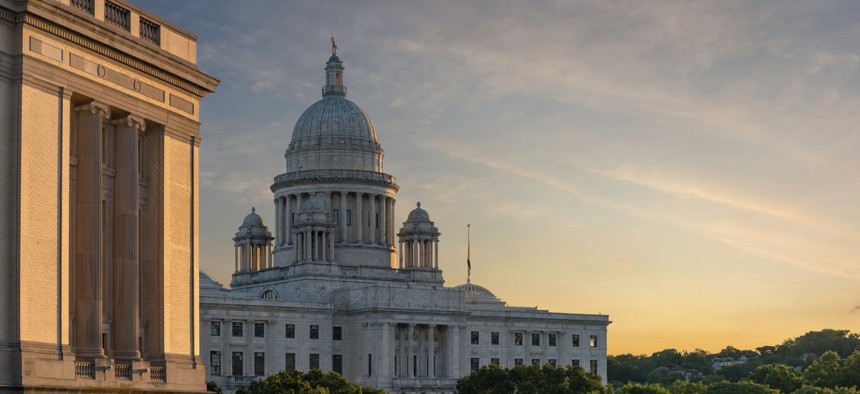Rhode Island Moves to Remove ‘Plantations’ From Official State Name

The Rhode Island State Capitol building. Shutterstock
The full name of the country’s smallest state, “The State of Rhode Island and Providence Plantations,” will be changed on official documents to remove the words that have an association with slavery.
In the latest move by state leaders to reckon with historic legacies of racism, Rhode Island Gov. Gina Raimondo announced that the state’s official name, The State of Rhode Island and Providence Plantations, would be shortened to remove the part of the name that evokes connotations to slavery.
“We have to acknowledge our history, that’s true, but we can acknowledge our history without elevating a phrase that’s so deeply associated with the ugliest time in our state and in our country’s history,” Raimondo said.
The second half of the name—Providence Plantations—will no longer appear on executive documents, state employee paychecks, and executive agency websites.
Some lawmakers, including state Sen. Elaine Morgan, questioned whether the state had the money to print new checks and stationery. “We are facing a historic deficit,” Morgan said in a statement. “I would like to see a fiscal note that explains just how much making this change immediately is costing Rhode Island taxpayers.”
Scrapping the expanded name is a topic that has come up before. With previous ballot initiatives and other legislative attempts to change the state name, some historians have noted that the word “plantation” attached to Rhode Island’s name isn’t a reference to large farms that depended on slave labor in the way the modern word is. Plantation in the context of the original colony of Providence Plantations in 1663 was a synonym for “settlement.” Rhode Island, one of the original 13 colonies, actually was the first to abolish slavery, but the law was largely unenforced.
However, as the state acknowledged in a press release announcing the change, “words and symbols can take on new meanings over time.”
“We can’t ignore the image conjured by the word plantation,” Raimondo said. “We can’t ignore how painful that is for Black Rhode Islanders to see that and have to see that as part of their state’s name. It’s demoralizing. It’s a slap in the face.”
Because the change is being done by executive order, the switch has limitations outside of the governor’s office. A more sweeping removal of the latter half of the name would require Rhode Island voters to approve a constitutional amendment. The state Senate passed a measure last week that would put a referendum on the November ballot—a measure that 78% of Rhode Island voters rejected in 2010.
State Sen. Harold Metts, who led the initiative to change the state’s name a decade ago and also sponsored the legislation this year, said that he has more hope for change this time.
“A decade has passed since the public was asked this question,” he said in a statement. “Attitudes may have changed substantially, even in the past few years—and even in the past few weeks.”
At the local level, Providence Mayor Jorge Elorza signed an executive order on Juneteenth to remove the word “Plantations” from official city documents, saying that while it “does not correct generations of pain and violence against our Black and Indigenous residents” it can be a “step to build a better, brighter future together.”
Keith Stokes, an advisor to the Rhode Island Black Heritage Society, agreed that changing the name is “a starting point, not an endpoint.”
“I think there’s a larger issue to discuss here,” he said. “One of the biggest challenges is not only institutional racism but its invisibility. History is taught through a white viewpoint. This is an opportunity for Rhode Island to lead the nation in how we educate our citizens on African American history.”
Stokes, who is an eighth generation Newport resident and a descendant of first Black man elected to the Rhode Island General Assembly in 1885, said that many people in Rhode Island don’t know the state’s historic connections to the slave trade. Even though slavery was outlawed in the colony in 1652, Rhode Island merchants carried over 100,000 enslaved Africans into North America in the 18th century, with Newport being the leading slave port before the American Revolution.
Now, as calls grow for the removal of Confederate statues and other public monuments to slavery and racism, it’s a unique time to “reclaim public spaces and how history is taught,” Stokes said. He hopes that more people can learn about Africa before European colonization, so that Black Americans aren’t defined by enslavement. “My grandmother used to say, ‘Slavery is how we got here, but it tells you little about who we are as a people,’” he said.
In 2014, Rhode Island enacted legislation creating a commission to devise curriculum for teaching Black history in the state’s public schools. Another bill passed by the state House last week would implement Black history curriculum starting in the 2022-2023 school year. Stokes, who has been a part of shaping the curriculum, said that he’s excited that public awareness on this issue will bring it “to the next level.”
“This is an opportunity to advance inclusive education, particularly through public schools,” he said. “We have the resources, but what we’ve lacked is the political will to fully establish this. Now is the time to seize on that opportunity.”
Emma Coleman is the assistant editor for Route Fifty.
NEXT STORY: Cities Brace For ‘Collision Course’ Of Heat Waves And COVID-19






